Rainy Travel Log. (III)
Mohammad Hussein Ghadami
Translated by: Fazel Shirzad
2019-5-28
A door…anything else
It's time to say goodbye; a future date for "the Night of Reminiscence" in Art Center and the pursuit of reminiscence program and the record of oral history of Iraqi comrades in Baghdad provided that we invited him (Seyed Hashem Heider) to a night of reminiscence and visit Supreme Leader.
He call one of the comrades.
- Haj Dawood! Let's come to be coordinated with these men for the Night of Reminiscence.
Someone, who was from Lorestan, immediately says:
- First, you must make a plan here, then make it in Iraq; the road of Baghdad passes through the Pol-e Dokhtar!
We also talk with a theologian armed by a shovel.
- I am Hosseini from Bonab city, East Azerbaijan. Human beings are members of a whole; we are in one essence and soul. Firstly it is accord our religion rules, in the second we have a human duty to help needy and wronged people; we go wherever we are asked for help. Once it was the time of war and jihad, we defense against enemy with gun, and now it's time to take a shovel. This event (flood) is not less than a war. Today, we came here heartily. Imam Ali ibn Abi Talib is a role model for us. wherever there are needy people, we obey the command of our dear leader; we are ready to sacrifice.
-How long are you deployed here?
-For a week. The electrical gadgets, TVs, refrigerators, and their properties were all injured. We pull them out from dust and mud…
The audacious road grader entered our discussion. Taking photo of him, we say goodbye to him.
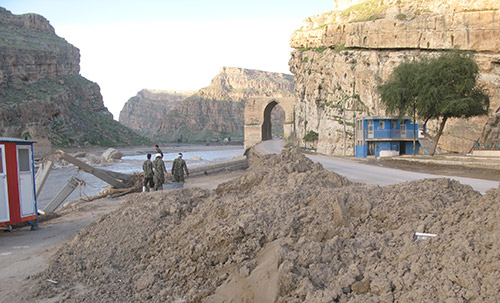
The remained underpass of Pol-e Dokhtar
It is near noon and Saman is waiting:
- How awesome you came back! I said you must have gotten to Glaz ... You did not hit you anymore! But remember, boot boots should be delivered to them.
-What good wind take you back? I thought you were trapped in muds…if you didn’t come, it wouldn’t be a cause for concern; the boots are treasury chests.
We start to go the headquarters. On the way, we are talking about the war, fronts, rain, flood, river and lake. Keyvan begins to speak first:
- At the time of war, once it was heavy rain day in Mehran[1]. Towards night, I found someone came in rush and said, "Let's go! Someone is afloat and need help!" we took rope and equipment. We got on car and went fast. We saw that all over the plain was like a sea! The flood was so powerful that it pull a heavyweight trailer into water in rolling way. The driver stretched himself out of window jumped on the roof of car. We started to help; we wanted use a rope, but we found that flood might pull us into the water...
-What happened at last?
- At last, he was saved by a helicopter.
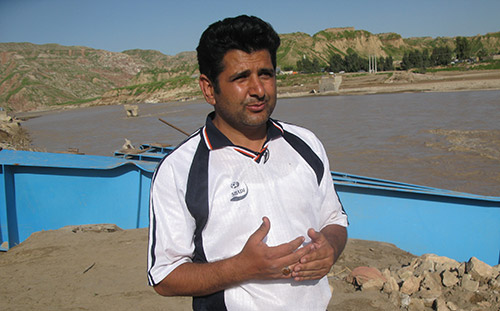
At last, he was saved by a helicopter
- How many times has it told that you should not make a joke with nature? It enough to encroach on nature! Who listens these words?
I read an interesting sentence somewhere, it was: "The river is home of water; if you ruin its house, it will ruin yours."
Words lead to another words:
- I have friends who is from Amol[2]. He said that, in their village, there are lots of houses built on the bank of river caused the river to lose width from 300 to 30 meters. Once upon a time huge flood came and their homes and lives were flooded.
-It is not still a warning lesson
The car is moving quickly and I am looking and reading the design and inscriptions on the walls of street's sides and keep them in mind: "The Bridge is not alone", "Human beings are members of a whole ", "We will stay here", "free carpet-wash", "Book publishing house", and some the Quran verse of Spider sura and Faraj prayer[3] were written on the wall of mosque.
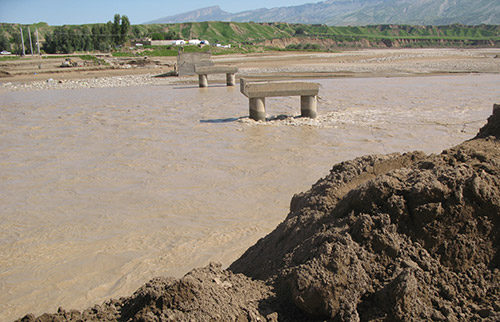
The remains of the bridge
We arrive in mosque at time of prayer. Imam of prayer in congregation is same "Seyed Hashem" who was the member of Iraq's Popular Mobilization Forces. He entered into the mosque not to be involved in talk with the comrades, and attend in his meeting soon. But after prayer in congregation, Basij radio[4] reveals his presence in there. Immediately, the comrade tries to take memorable photos with him; he is pushed to make a short speech:
- ... Imam Khomeini started his revolution with a shout. It became a movement, a revolution, and then a blissful warfronts, which was for Imam and martyrs in 1963. A movement can be gradually developed. This is an introduction of the advent of Imam Zamān[5].
The comrades insist him to continue his speech. One of the comrades’ patience run out and pull the hand of Seyed and says:
-Oh, comrades! Seyed is tired and going to travel to Semnan County[6]!
The banquet is provided and we have rice and canned fish. After taking a bit of rest, we wear the boots and move. The weather is cloudy and rainy. On the second round the corner of road, the red rocket stands in the sky, how strange is it! We go ahead, it is balloon like a rocket:
- It's probably a telecommunication mast.
Zarabi speaks about Art Center of country and Lorestan, Saman pour out his heart:
- Sir, we are here for working, and documentary unit of Art Center of all provinces, especially Tehran, must take film, prepare document and report, but, actually, we did not see anyone here.
Zarabi, as usual, reduces speed:
- don't give up, sir, who is born in 60s, "I knock the door of house ..."
And I make the continuance of this sentence:
-…until you and I remake this ruined places
- Here you need someone like Avini[7] ... we miss him. God rest his soul!
The destination is Chammehr village where have been suffered from the most damage. It has magnificent path and wonderful views. We stop at the end of a summit and uphill, or in the other words, we stop in beginning of a slope. The sign "Continue with a heavy gear!" indicates the dangerous downhill of road. After a brief stop and taking photo, we descend the slope, we'll reach the end of road. Next to river, Saman explain before get on boat:
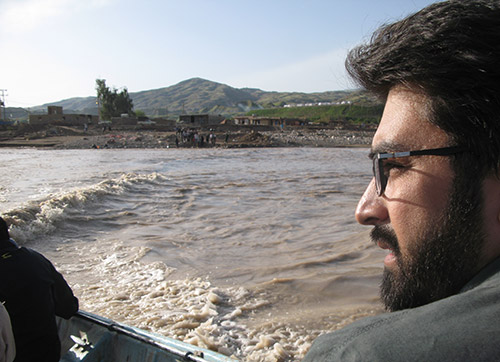
Towards village Chammehr
Here is Chammehr village, placed on the environs of Pol-e Dokhtar, where have been suffered from the most damage; now we are going to see other side of water; all the houses of riverside are ruined and destroyed. The bridge is destroyed and some pieces of iron are only remained. Now, there are two boats being used to transfer people. The next problem is house and residence of family members; the jihadist groups are helping to reduce the agonies of people a little.
It's our turn. We get on the boat and enter ourselves into a turbulent river and flood. The young boatman is driving boat and knows the tactic of passage. At first, he drives against the current fast; after passing through the point of pressure, he find an angle towards the station and the village shore, like the angle of light break. On the other side of river, villagers are waiting for the boat...
The village seemed to be uninhabited. Families are sheltered on a high hill in the Red Crescent's tents. A little bit ahead, we try to speak with two rustic pedestrians, who have bags in hand:
- ...initially we did not believe that such a flood came. There wasn’t such flood happened in the past at all. When the level of water was increased, we all escaped. Some people also sheltered from flood in backyard and make tent. But, when flood came, the backyards were not also safe; all people sheltered in hills, but a pregnant woman was left in backyard and no one dared to go near the flood; all of us was watching from far distance and worried. We wanted to save her, but there was nothing we can did about it, because we would be sunk in the water; her hot-blooded cousin put off his clothes and wanted to go and save her and said that he would be sunk or save her.
-Was he able to swim?
- Yes. Many of people was able to swim, but it was difficult to swim in the flood that pull out the irony bridge and crushed it. Anyway, I don’t know how he was saved in the flood. While the cousin was going to jump into water, I heard a sound; we raised our head and saw a helicopter in the sky, and it was coming towards that house. We were all happy...In short, that lady was carried to the Red Crescent's helicopter and rescued.
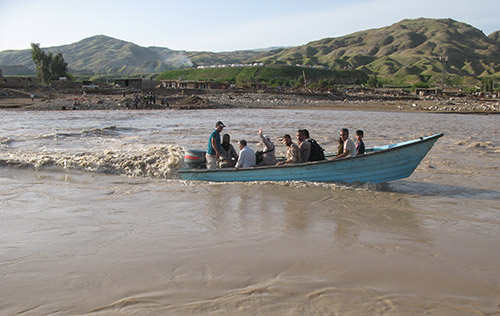
The calm after the storm
-well, thanks God. Has the storm happened here yet?
- Yes. It has.
-When?
- Once, It has happened in 2005, but not so horrible. Of course the bridge has been broken and repaired.
The rural man was distressed had untold words a lot and talked without cessation, and did not give time and opportunity to his young comrade to speak. The young man tried to speak for several times, but the story of old man had no cessation and end. Honestly, we return the camera lens towards young and grateful man.
- were you in sleep or awake when flood taken place?
- When the flood taken place, there was such a terrible sound that no one slept. We make firewood next to mosque until four o'clock in the morning. We were waiting for flood to be stopped and we get back home, but it began to rise gradually. We had a flashlight, we regularly report that the level of water was low there was no problem. Of course, last week, we had a flood that caused a disaster a bit, but actually the speed of flood was different, when it took place, everyone was running away. It wasn't at all a joke; the flood carried all of our properties.
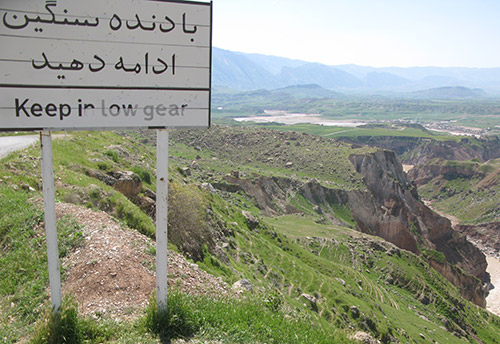
On the highlands of river Kashkan
- Where is it exactly? What is the name of this river?
-it is in Lower-Chammhar. The name of river is Kashkaneh, and the dam named "Seimoreh" is behind us.
He pointed far:
- There, we were stationed on that hill ... everyone cried and called God because the village was ruined. All our life went underwater.
- is there someone in your relative to be injured?
- My father was injured, he was taken to the capital city of province by a helicopter. We did not see it for twelve days, we just telephone each other, and he was shown in news show.
- How was people's help?
Here, all of people are giving help. Children should be paid attention more, because they need to use of their spare times. They don’t like stay in tent; it is hot during day and it is cold at nights. They need entertainment. They need poem, story, painting, book and movie. They have not taken shower for a long time. Today, if it is possible, I will take them to Pol-e Dokhtar to take shower. Desert-bathroom are small and there aren’t enough ones. It is very difficult women and children to use these bathrooms. There should be a suitable connex box for women's bathroom.
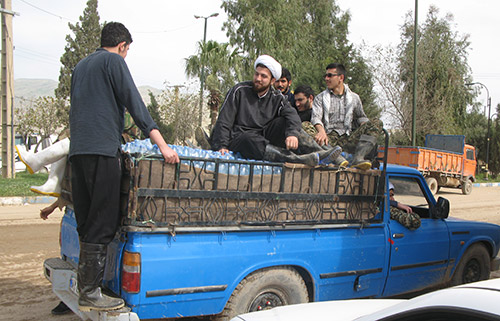
To be shared in sorrow is better than in language
And… angry pedestrian waved hand as a sign of protest, growled and passed.
-What did he say?
-Substantially nothing. They, poor people, are not in mental balance. He said what we take photo and film. He thought we were taking memorial photos.
- Well, go on! Do you have any injured veteran or warriors here?
-yes. In fact, my uncle is an injured veteran. He doesn't have a hand and a foot. He was Member of Parliament. If I say his name, you'll remember him.
- What his name?
- Ali Bual Fatah, he is living in Tehran.
It is a good opportunity to remember the night of reminiscence and ... I introduce this ceremony, and he voluntarily give the number of his uncle to be invited in this ceremony.
-my son-in-low also went to warfront and martyred.
-what was his job?
- A teacher
- What was his name?
- Javad Salmanian, a good football player; now, a sport complex is in the name of him.
-…
Tanks God! some drinks are still remained for guests
Night is coming gradually. Friends are waiting next to boat. We should say goodbye. Although they do not have the space to stay, they insist that we stay night there.
To be continued…
[1] it is a city in and the capital of Mehran County, Ilam Province, Iran. The county is populated by Feyli Kurds. Mehran is located near Iran's western border with Iraq.
[2]it is a city and the administrative center of Amol County, Mazandaran Province, Iran.
[3] It is a du'a which is attributed to Imam Mahdi and is begun with the phrase of “Elahi Azomal Bala ”. The —initial part of— du'a has been quoted for the first time in the book of Konuz al-Nejah. There are plenty of profits in dua Faraj
[4] It used to say to some volunteer soldiers (Basij) that, at the time of war, was aware of everywhere, and there was no accident to be hidden from their sharp eyes.
Muḥammad ibn Al-Ḥasan al-Mahdī, also known as Imām Zamān, is believed by Shia Twelver Muslims to be the Mahdī, an eschatological redeemer of Islam and ultimate savior of humankind and the final Imām of the Twelve Imams
[6] It is is one of the 31 provinces of Iran. It is in the north of the country, and its center is Semnan.
[7] He was an Iranian documentary filmmaker, author, and theoretician of "Islamic Cinema." He studied Architecture at Tehran University in 1965. During the Iranian Revolution, Avini started his artistic career as a director of documentary films, and is considered a prominent war filmmaker.
Number of Visits: 4490








The latest
- An Eternal Lie!
- The 368th Night of Remembrance – Part 2
- Agents in Search for the Fighter
- The Embankment Wounded Shoulders – 13
- The Necessity of Standardizing Oral History and Criticism of General Mohsen Rezaei
- The 368th Night of Remembrance – Part 1
- Oral History News of Khordad 1404 (May 22nd – June 21st 2025)
- Najaf Headquarters Human Resources
Most visited
- Oral History News of Khordad 1404 (May 22nd – June 21st 2025)
- Najaf Headquarters Human Resources
- The Necessity of Standardizing Oral History and Criticism of General Mohsen Rezaei
- The 368th Night of Remembrance – Part 1
- The Embankment Wounded Shoulders – 13
- Agents in Search for the Fighter
- The 368th Night of Remembrance – Part 2
- An Eternal Lie!
Operation Beit al-Moqaddas and Liberation of Khorramshahr
After Operation Fat’h al-Mobin, we traveled to Kermanshah and visited Sar-e-Pol-e-Zahab before heading to Ilam. During Operation Beit al-Moqaddas, the 27th Brigade was still receiving support from the West. We maintained contact with individuals who had previously worked in Area 7 and were now leading the brigade. It was through these connections that I learned about Operation Beit al-Moqaddas.Memoirs of Hujjat al-Islam Reza Motalebi
Hujjat al-Islam Reza Motalebi is a cleric from Isfahan. Before the revolution, he was the imam of the Fallah Mosque – which was later renamed Abuzar Mosque. By his presence and efforts, Abuzar Mosque soon became a base for supporters of the Imam and the revolution. After the victory of the revolution, he played a role in uniting forces and maintaining political vitality in southwest Tehran.The Necessity of Receiving Feedback in Oral History
Whenever we engage in a task, we naturally seek ways to evaluate our performance — to correct shortcomings and enhance strengths. Such refinement is only possible through the feedback we receive from others. Consider, for instance, a basketball player whose shots are consistently accurate; should he begin shooting blindfolded, his success rate would rapidly decline, as he would be deprived of essential feedback from each attempt.Sir Saeed
The book “Sir Saeed” is a documentary [narrative] of the life of martyr Seyyed Mohammad Saeed Jafari, written by Mohammad Mehdi Hemmati and published by Rahiyar Publications. In March 2024, this book was recognized as one of the selected documentary biographies in the 21st edition of the Sacred Defense Book of the Year Award. The following text is a review on the mentioned book.

